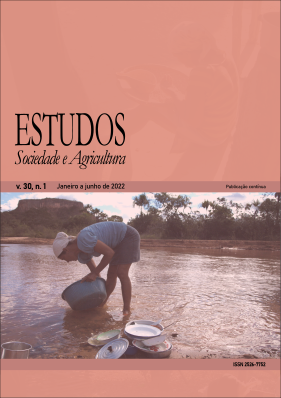Mokichi Okada’s Nature Farming: moral and political experimentation as a source of ecological innovation
DOI:
https://doi.org/10.36920/esa-v30n1-4Keywords:
ecological transition, contemporary religious philosophy, agricultural innovation, cosmopolitics, emerging agriculturesAbstract
This text analyses the development of Nature Farming in Brazil; this farming system is espoused by a group of organizations linked to the Brazilian Church of World Messianity which consider it necessary to achieve “Paradise on Earth,” a world "free of disease, poverty, and conflict” envisioned by Mokichi Okada, the Japanese founder of this movement. Following in the footsteps of the philosopher Emilie Hache, this case is considered as a potentially practical response to the contemporary ecological crisis, and understood to be simultaneously moral, political, and epistemological in origin. The text highlights how the two main agricultural activity systems supported by the movement (market gardening and poultry farming) have followed very different evolutionary paths. Both systems are subject to the same group of tensions: the movement's identity and religious requirements on the one hand, and technical and financial performance requirements on the other. These tensions are resolved very differently due to the distinct constraints on gardening and poultry raising within the Nature Farming philosophy. This analysis highlights the contributions and limitations of this dynamic as well as its reach, which extends well beyond its own borders, revealing how a moral and political experiment of this type can be relevant in addressing the challenges of sustainable development.
elocation-id: e2230104
Received: 08.13.2021 • Accepted: 02.08.2022 • Published: 02.23.2022
Original article / Blind peer review / Open access
Downloads
Downloads
Published
Issue
Section
License
Copyright (c) 2022 Julien Blanc, Paulo Eduardo Moruzzi Marques

This work is licensed under a Creative Commons Attribution 4.0 International License.
Authors who publish in this journal agree to the following terms:
a) Authors maintain the copyright and grant the journal the right of first publication, with the work simultaneously licensed under the Creative Commons Attribution License which allows the sharing of the work with acknowledgment of authorship and initial publication in this journal.
b) Authors are authorized to take additional contracts separately, for non-exclusive distribution of the version of the work published in this journal (eg publish in institutional repository or as a book chapter), with acknowledgment of authorship and initial publication in this journal.
c) Authors are allowed and encouraged to publish and distribute their work online (eg in institutional repositories or on their personal page) at any point before or during the editorial process, as this can generate productive changes, as well as increase the impact and citation of published work (See The Effect of Free Access).






